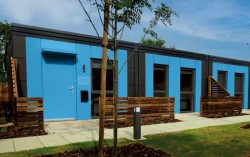Arguably one of the first innovations in the UK to surpass the predicted Future Homes Standard, back in 2021 MODULHAUSTM was crowned 'Winner of Winners' at the Offsite Awards. Trevor Richards, Operations Director at VOLUMETRICTM – the company behind this achievement, discusses how they were 'ahead of the game' in terms of designing modular homes.
In January 2021 when the government published the outcome of the Future Homes Standard consultation, the first MODULHAUSTM units had been designed and manufactured to incredible energy efficiency standards. Right from the initial concept stage, the decision was reached to develop a modular solution that would exceed the Future Homes Standard to relieve the burden on Local Authorities of ongoing expenses associated with traditional interim accommodation and negate fuel poverty.
The Devil is in the Detailing
There was a lot more to achieving the predicted Future Homes Standard than we initially thought. Getting the balance right was challenging. Sometimes the benefits of one solution counter-acted the benefits of another, it seemed like it was one step forward, and one back. Not willing to compromise on expected performance, our team modelled and re-modelled our designs, with countless materials and technologies assessed and evaluated to ensure we achieved our optimum position.
We were on a mission and had an end goal in sight. Our aim was to create the ultimate modular solution for developer Hill Group to support their Foundation200 initiative – a charity established by Hill to gift 200 single person interim homes for rough sleepers to mark the company's 20th anniversary.
The pioneering MODULHAUSTM system is now the technology behind a range of award-winning interim homes – all exceeding the Future Homes Standard. SOLOHAUSTM, the initial single person home for rough sleepers is an outstanding success story, with 200 now manufactured and allocated under the Foundation200 initiative to homeless charities and councils across the UK. This was quickly followed by the double occupancy DUOHAUSTM and finally FAMILYHAUSTM was launched last year maximising space and comfort, with two and three bedroom options for a safe, family friendly home offering an alternative solution to low quality, high-cost interim housing.
SOLOHAUSTM, DUOHAUSTM and FAMILYHAUSTM are all now commercially available and have been used for a range of interim requirements from providing onsite accommodation for healthcare key workers, to housing refugees and those who find themselves homeless.
The Future Homes Standard outlines changes to Building Regulations Part L (conservation of fuel and power) and Part F (ventilation). These regulations will ultimately come into effect in 2025 to ensure that all new homes in England are futureproofed with low-carbon heating systems and high levels of energy efficiency. These standards should ensure that all new homes will produce 75-80% less carbon emissions than houses delivered under current Building Regulations.
The first interim uplift, surrounding changes to Part L came into force last year to ensure new homes built from 2022 will produce 31% less carbon emissions. Full technical specification for the Future Homes Standard will be consulted later this year, with the necessary legislation introduced ahead of implementation in 2025. So, change is happening and happening at pace.
Net Zero Living
The futureproof energy strategy for our MODULHAUSTM range is designed to exceed the Future Homes Standard with Environment B and A rating and emissions as low as 229.5KG CO2 /year.
Modules are factory fitted with sustainable technologies, low energy lighting and white goods together with controlled flow shower mixers and dual flush cisterns to minimise energy and water consumption.
Our revolutionary Energy Centre, developed by VOLUMETRICTM – meets the energy requirements of up to six modules. Containing an Air Source Heat Pump (ASHP), Mechanical Ventilation and Heat Recovery (MVHR) systems, solar panels and a battery storage unit, this intelligent technology is digitally connected to each module – instantly responding to demands for hot water, heating and energy requirements.
Although modules have mains connections, the Energy Centre can meet demand at most times of the year as energy generated during the day can be stored in battery cells until required. Surplus energy goes back into the grid, carbon offsetting – creating 'free' energy and net zero living.
MODULHAUSTM is also fully relocatable and can be moved to meet future demands with all aspects of the dwelling fully recoverable, including screw-pile foundations and service umbilical pipe work, along with the Energy Centre, meaning that over 95% of a project can be re-used in another part of the country at any point in the future.
This has been a massive learning curve and reaching the Future Homes Standard is simply not just a case of adding more insulation. It is far more complex than that. With 2025 on the horizon and as a trailblazer in reaching these challenging standards, I would say it is better to take time now and get your design and testing protocols right, than taking a risk and failing to meet the complexities involved.
For more information visit: www.volumetric.co.uk









